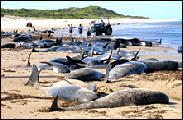EUROPEAN CETACEAN BYCATCH CAMPAIGN
"Man is but a strand in the complex web of life"
"Man is but a strand in the complex web of life"
Dozens of whales die after stranding
By Juliet Rowan
The New Zealand Herald
30th November 2004
More than 50 dead whales will be buried today after a mass stranding at a Coromandel beach.
Seventy-
A local resident discovered the stranded whales at the north end of the 4.5km beach about 10am yesterday and immediately alerted the Department of Conservation.
Twenty DoC staff raced to the beach, where 50 volunteers helped them to try to refloat the whales, which ranged in size from 4m to 6m.
DoC Hauraki area manager John Gaukrodger said the rescue effort was hampered by the fact the whales had been out of the water for hours.
The stranding was not noticed earlier because several hundred metres of dunes separate the beach from houses.
He said late last night the 10 remaining whales had been out of the water for close to 24 hours. "It could be a bit much to expect they will be salvaged."
A digger was used to help to channel water around the whales.
It also dug a channel to float them out to sea.
Today, the machine would dig graves for the whales that did not survive.
"With that number, we'll be burying them right on site," Mr Gaukrodger said.
Mr Gaukrodger said the stranding had been an emotional ordeal for some of the volunteers, who included members of local iwi, residents and members of Project Jonah, who are trained in whale rescues.
It was the biggest whale stranding in the area in over a decade. Most strandings in the Coromandel have involved individual whales.
Mass strandings round the New Zealand coast are not uncommon, though the reasons remain unclear.
Whale experts say sometimes a herd may follow a sick leader or a young whale may strand by accident and the rest try to rescue it.
Mr Gaukrodger could not say whether the whales that were successfully refloated were out of danger.
They were moved into the seabound channel with flotation equipment. The main task before they could be moved was to keep them wet.
The DOC staff and volunteers covered the whales in water throughout the day.
Showery conditions and a rising tide made the job easier in the evening.
But while the high tide at 10.30pm helped the whales, the rescue team struggled to stay warm.
An emergency call was put out to local residents for wetsuits. The team also needed food and hot drinks.
The rescue operation was coordinated from the DOC office in Thames.
Mr Gaukrodger said Opoutere's remote location, on the east coast of Coromandel Peninsula 17km north of Whangamata, made it particularly difficult.
Getting people and vehicles to the stranding required crossing private properties and large tracts of sand.
Cellphone coverage at the beach was sporadic so radios were used.
DOC would compile a report on the effort to ensure lessons were learned for future whale strandings.
Male pilot whales can weigh up to 2.3 tonnes and females up to 1.3 tonnes. They are usually found in pods of 20 to 100, but groups of more than 1000 long-
The last big stranding of pilot whales in New Zealand was at Stewart Island in January last year.
The pod of 159 stranded 5km from the Half Moon Bay settlement of Oban on January 8. Just 39 were refloated.
The stranding came within a day of two mass strandings in Tasmanian waters within 24 hours.
Fifty-
Parks and Wildlife Service district manager Shane Hunniford said 18 of the whales had died, but 22 had been carried back to the water and every effort was being made to save the 13 still alive onshore.
The stranding was the second in Tasmanian waters in just 24 hours -
Hopes for the survival of an offshore pod of 17 whales were dashed yesterday with the discovery that all had died.
The mixed group of long-
The final death toll was 73 whales and 25 dolphins and there were no further survivors in the area, Mr Brennan said.
King Island ranger Nigel Burgess said the scene of the mass stranding was bleak.
"They're all dead and they're starting to wash out on the tide and wind. It's not particularly bright," he said.
He said that wildlife officers had taken tissue samples from the carcasses for further analysis.
More than three quarters of Australia's whale strandings occur in Tasmania.
The most common species to come ashore are the common dolphin, the sperm whale, the long-
University of Tasmania associate professor Mark Hindell carried out research which found a 10 to 12 year cycle of strandings which would peak around this summer.
He said that while the frequency of strandings followed a somewhat predicable pattern, the causes were unknown.
"That's still one of the great mysteries really, what causes particular animals to strand, or particular groups to strand," associate professor Hindell said.
"There's probably as many different causes as there are strandings.
"I don't think there's any question it's a naturally-
A combination of oceanographic factors combined to bring large numbers of whales into Tasmanian coastal waters, leading to an increase in the number of strandings at certain times, he said.
"I think it's remarkable that they're so close together but we know that we're in a period of particularly high strandings at the moment -
"I expect it might continue for a little while, and then hopefully, it will drop away again over the next few years."
Top
The Opoutere beach whale deaths came within days of two mass strandings in Tasmanian waters, including the stranded pod (pictured) on King Island.

Picture / Reuters